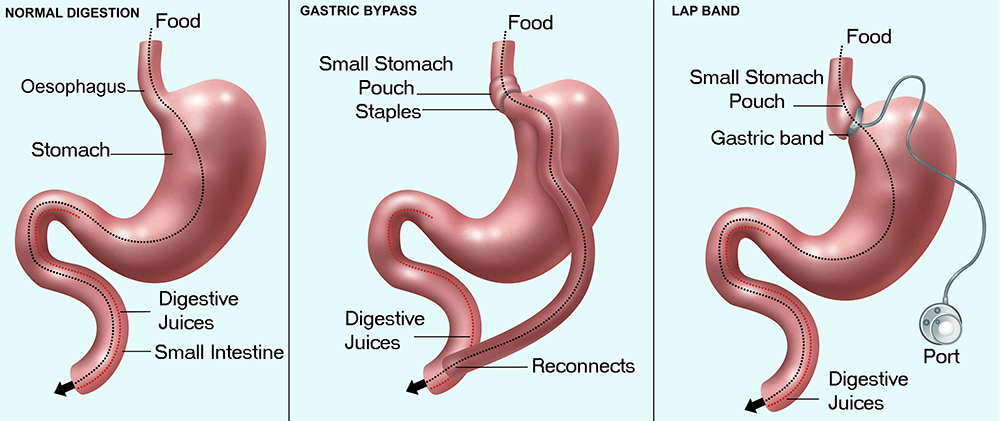Bariatric surgery has emerged as a beacon of hope for millions struggling with obesity, offering not just weight loss but a transformation in health and quality of life. This procedure isn’t merely a surgical intervention; it’s a stepping stone towards a healthier, revitalized life. In this detailed exploration, we delve into the life-changing benefits of bariatric surgery, addressing the myriad of advantages it holds. Furthermore, we’ll touch upon the crucial aspects every potential candidate should consider, including the bariatric surgery benefits and risks, costs, types of weight loss surgery, and its safety profile, providing a balanced perspective to help you make an informed decision.
Bariatric surgery stands as a monumental step not just in the battle against obesity but as a transformative journey towards overall well-being. The initial allure of significant weight loss is indeed compelling, but the true essence of bariatric surgery benefits unfolds in the myriad ways it reshapes one’s health landscape. Let’s delve deeper into how this surgical intervention goes far beyond mere weight reduction, heralding a new era of health, vitality, and emotional well-being.
Top 7 Bariatric surgery benefits: Transformative Weight Loss
The journey begins with the noticeable decline in the scale, but this is merely the prologue to a story of profound health revitalization. Bariatric surgery acts as a pivot, altering the trajectory towards a future less burdened by weight-related health issues. Conditions such as type 2 diabetes, hypertension, and heart disease, which once seemed inevitable, now find themselves on the retreat, thanks to the substantial weight loss facilitated by this procedure.
health revitalization. Bariatric surgery acts as a pivot, altering the trajectory towards a future less burdened by weight-related health issues. Conditions such as type 2 diabetes, hypertension, and heart disease, which once seemed inevitable, now find themselves on the retreat, thanks to the substantial weight loss facilitated by this procedure.
1. Enhanced Longevity and Reduction in Comorbidities
One of the most compelling narratives in the realm of bariatric surgery is its ability to script a longer, healthier life. The reduction in obesity-related health issues not only enhances quality of life but also adds years to it. Gastric bypass surgery, a common bariatric procedure, showcases sustained weight loss and health improvements in gastric bypass surgery years after the operation, highlighting the enduring nature of its benefits.
2. Improved Cardiovascular Health
The heart, once beleaguered by excess weight, finds a new lease on life post-surgery. The significant weight loss achieved through bariatric surgery paves the way for a healthier cardiovascular system. Reduced risk of getting coronary heart disease, stroke, and peripheral heart disease are just the tip of the iceberg. Improvements in blood pressure, cholesterol levels, and overall heart function are direct dividends of the weight shed, painting a brighter future for heart health.
3. Remission of Type 2 Diabetes
Perhaps one of the most groundbreaking benefits of bariatric surgery is its potential to turn the tide against type 2 diabetes. Numerous patients have seen their blood sugar levels normalize, dramatically reducing, or in some cases, eliminating the need for diabetes medications. This remarkable outcome underscores the surgery’s pivotal role in controlling a condition that is often deemed chronic and irreversible.
4. Alleviation of Depression
The weight of obesity is not solely measured on scales but also in the emotional toll it exacts. The transformation afforded by bariatric surgery extends into the realm of mental health, with many experiencing a resurgence in self-esteem, a more positive body image, and an overall uplift in mood. The reduction in symptoms of depression post-surgery is a testament to the holistic benefits of this transformative journey.
5. Relief from Joint Pain
Every step taken under the burden of excess weight is a reminder of the strain placed on joints. The relief comes palpably post-surgery as the weight begins to diminish, easing the pressure on knees, hips, and backs. The consequent reduction in pain and improvement in mobility offers a newfound freedom, encouraging a more active and engaging lifestyle.
6. Improved Fertility
The impact of obesity on reproductive health can be profound, particularly for women in their childbearing years. Bariatric surgery emerges not just as a procedure for weight loss but as a beacon of hope for those facing fertility challenges. The benefits seen in improved fertility rates post-surgery offer a promising outlook for individuals looking to start or grow their families.
7. Sleep Apnea and Respiratory Improvement
Obesity’s role in exacerbating sleep apnea and other respiratory conditions is well-documented. The weight loss one can get as a result of bariatric surgery can lead to significant improvements in these conditions, enhancing the quality of sleep and reducing snoring. This not only improves night-time rest but also contributes to better health and reduced risk of conditions associated with sleep apnea.
In conclusion, the benefits of bariatric surgery transcend the conventional boundaries of weight loss. This life-altering procedure has the potential to redefine health parameters, offering a path not just to a slimmer physique but to a rejuvenated, healthier life. By addressing the root cause of numerous health issues associated with obesity, bariatric surgery paves the way for a future where the quality of life is significantly enhanced, making it a truly transformative journey.
Navigating Costs and Types of Surgeries
The journey to bariatric surgery is also shaped by financial considerations and the specific type of procedure chosen. Here’s what you need to know:
Bariatric Surgery Costs
The cost of bariatric surgery is influenced by the type of procedure, the surgeon’s experience, the facility, and geographic location. Insurance coverage for bariatric surgery varies widely, with many insurers requiring documented evidence of medically supervised weight loss attempts. Out-of-pocket expenses can be substantial, making it crucial for patients to understand all potential costs.
4 Types of Weight Loss Surgery
Are you wondering about, ‘ what are the 4 types of bariatric surgery?’ Here are the unique benefits and considerations:
- Gastric Bypass: Offers substantial long-term weight loss, may improve or resolve comorbidities rapidly.
- Sleeve Gastrectomy: It removes a portion of the stomach, leading to less food intake without affecting nutrient absorption.
- Adjustable Gastric Banding: A reversible procedure that deals with placing a band around the upper part of the patient’s stomach to create a small pouch.
- Biliopancreatic Diversion with Duodenal Switch: The most complex procedure, combining aspects of sleeve gastrectomy and intestinal bypass, offering significant weight loss but with higher risk of nutritional deficiencies.
Choosing the right procedure involves assessing individual health profiles, weight loss goals, and potential risks.
Addressing Common Concerns
While the allure of bariatric surgery benefits is undeniable, it’s imperative to approach this decision with a balanced perspective. Among the primary concerns are:
Nutritional Deficiencies
The alteration of the digestive system can lead to deficiencies in essential vitamins and minerals. Conditions such as anemia, osteoporosis, and neurological disorders can arise if post-operative nutritional guidelines are not strictly followed. Lifelong supplementation and regular nutritional assessments become indispensable parts of post-surgery life.
Surgical Complications
As with any major surgery, bariatric procedures carry risks such as infection, bleeding, and adverse reactions to anesthesia. Long-term complications may include gallstones, hernias, and issues related to the surgical alteration of the stomach and intestines, such as strictures or ulcers.
Lifestyle Adjustments
The success of bariatric surgery extends beyond the operating table. Patients must commit to significant lifestyle changes, including diet modifications, regular exercise, and frequent medical follow-ups. Emotional and psychological adjustments are also crucial, as patients adapt to rapid weight loss and changing body dynamics.
As you discuss with a healthcare provider it is essential to navigate these risks, ensuring that the decision to undergo bariatric surgery is informed and aligned with individual health goals and circumstances.
Is Bariatric Surgery Safe?
Advancements in surgical techniques and pre-operative care have significantly enhanced the safety of bariatric surgery. Minimally invasive approaches have reduced complications and recovery times. Proper patient selection, comprehensive pre-surgery evaluations, and choosing an experienced surgical team are key factors in minimizing risks, making bariatric surgery a safe option for many eligible candidates.
Reasons Not to Have Bariatric Surgery
Bariatric surgery isn’t a one-size-fits-all solution. Certain conditions or circumstances may render it less suitable, such as:
- Underlying medical conditions that increase surgical risks.
- Lack of commitment to lifelong dietary, lifestyle, and follow-up requirements.
- Psychological conditions that could hinder the adjustment to changes post-surgery.
For those contemplating this life-altering procedure, a deep and honest self-assessment, coupled with detailed discussions with healthcare providers, is essential to making an informed and beneficial decision.
Final Thoughts
Bariatric surgery is a lot more than just losing weight; it’s like starting a brand new chapter in life. It brings tons of benefits, from improving your health to making you feel better about yourself, and even helping you live longer. But, it’s not just about the surgery itself. Success comes from really understanding what you’re signing up for, including the risks, and being ready to make some big lifestyle changes afterward. If you’re thinking about taking this big step, it’s important to talk it over with doctors and figure out if it’s the right move for your health and your future. Makes you wonder, doesn’t it? Could this be the change you’ve been looking for?
FAQs
What lasting impacts does weight-loss surgery have on health?
Weight-loss surgery can drastically reduce weight over the long term, enhancing lifespan and quality of life by mitigating or eliminating conditions like sleep apnea, hypertension, and diabetes.
How does weight-loss surgery contribute to diabetes management?
Post-surgery, many individuals see a remission in type 2 diabetes due to substantial weight reduction and changes in hormone levels that enhance the body’s ability to regulate sugar.
Can undergoing weight-loss surgery boost heart health?
Absolutely, undergoing weight-loss surgery can lead to significant improvements in heart health by reducing risks associated with cardiac diseases, thanks to lowered cholesterol and blood pressure levels.
What mental health improvements are linked to weight-loss surgery?
Following weight-loss surgery, many report higher levels of self-esteem. It also includes decreased symptoms of depression and anxiety, and an overall boost in mental well-being due to the positive changes in their physical health.
Is there an increase in longevity post-weight-loss surgery?
Yes, individuals who undergo weight-loss surgery often experience a notable increase in longevity. This is attributed to the decrease in risks for obesity-related fatal conditions, including certain cancers and cardiovascular diseases.






